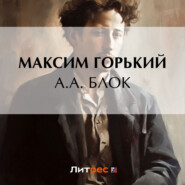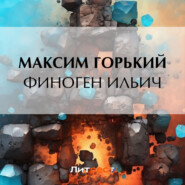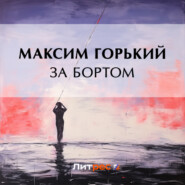По всем вопросам обращайтесь на: info@litportal.ru
(©) 2003-2025.
✖
Through Russia
Настройки чтения
Размер шрифта
Высота строк
Поля
The fair-headed muzhik blew the ashes from his cigarette, and observed:
"No such thing is there at cards as luck – only skill."
At this juncture we saw approaching us softly from across the rivulet a young carpenter who wore a moustache. He halted beside us, and drew a deep breath.
"Well, mate?" the fair-headed muzhik inquired.
"Would you mind giving me something to smoke?" the carpenter asked. The obscurity caused him to look large and shapeless, though his manner of speaking was bashful and subdued.
"Certainly. Here is a cigarette."
"Christ reward you! Today my wife forgot to bring my tobacco, and my grandfather has strict ideas on the subject of smoking."
"Was it he who departed just now? It was."
As the carpenter inhaled a whiff he continued:
"I suppose that man was beaten to death?"
"He was – to death."
For a while the pair smoked in silence. The hour was past midnight.
Over the defile the jagged strip of sky which roofed it looked like a river of blue flowing at an immense height above the night-enveloped earth, and bearing the brilliant stars on its smooth current.
Quieter and quieter was everything growing; more and more was everything becoming part of the night…
One might have thought that nothing particular had happened.
KALININ
Whistling from off the sea, the wind was charged with moist, salt spray, and dashing foaming billows ashore with their white manes full of snakelike, gleaming black ribands of seaweed, and causing the rocks to rumble angrily in response, and the trees to rustle with a dry, agitated sound as their tops swayed to and fro, and their trunks bent earthwards as though they would fain reeve up their roots, and betake them whither the mountains stood veiled in a toga of heavy, dark mist.
Over the sea the clouds were hurrying towards the land as ever and anon they rent themselves into strips, and revealed fathomless abysses of blue wherein the autumn sun burned uneasily, and sent cloud-shadows gliding over the puckered waste of waters, until, the shore reached, the wind further harried the masses of vapour towards the sharp flanks of the mountains, and, after drawing them up and down the slopes, relegated them to clefts, and left them steaming there.
There was about the whole scene a louring appearance, an appearance as though everything were contending with everything, as now all things turned sullenly dark, and now all things emitted a dull sheen which almost blinded the eyes. Along the narrow road, a road protected from the sea by a line of wave-washed dykes, some withered leaves of oak and wild cherry were scudding in mutual chase of one another; with the general result that the combined sounds of splashing and rustling and howling came to merge themselves into a single din which issued as a song with a rhythm marked by the measured blows of the waves as they struck the rocks.
"Zmiulan, the King of the Ocean, is abroad!" shouted my fellow traveller in my ear. He was a tall, round-shouldered man of childishly chubby features and boyishly bright, transparent eyes.
"WHO do you say is abroad?" I queried.
"King Zmiulan."
Never having heard of the monarch, I made no reply.
The extent to which the wind buffeted us might have led one to suppose that its primary objective was to deflect our steps, and turn them in the direction of the mountains. Indeed, at times its pressure was so strong that we had no choice but to halt, to turn our backs to the sea, and, with feet planted apart, to prise ourselves against our sticks, and so remain, poised on three legs, until we were past any risk of being overwhelmed with the soft incubus of the tempest, and having our coats torn from our shoulders.
At intervals such gasps would come from my companion that he might well have been standing on the drying-board of a bath. Nor, as they did so, was his appearance aught but comical, seeing that his ears, appendages large and shaggy like a dog's, and indifferently shielded with a shabby old cap, kept being pushed forward by the wind until his small head bore an absurd resemblance to a china bowl. And that, to complete the resemblance, his long and massive nose, a feature grossly disproportionate to the rest of his diminutive face, might equally well have passed for the spout of the receptacle indicated.
Yet a face out of the common it was, like the whole of his personality. And this was the fact which had captivated me from the moment when I had beheld him participating in a vigil service held in the neighbouring church of the monastery of New Athos. There, spare, but with his withered form erect, and his head slightly tilted, he had been gazing at the Crucifix with a radiant smile, and moving his thin lips in a sort of whispered, confidential, friendly conversation with the Saviour. Indeed, so much had the man's smooth, round features (features as beardless as those of a Skopetz [A member of the Skoptzi, a non-Orthodox sect the members of which "do make of themselves eunuchs for the Lord's sake."], save for two bright tufts at the corners of the mouth) been instinct with intimacy, with a consciousness of actually being in the presence of the Son of God, that the spectacle, transcending anything of the kind that my eyes had before beheld, had led me, with its total absence of the customary laboured, servile, pusillanimous attitude towards the Almighty which I had generally found to be the rule, to accord the man my whole interest, and, as long as the service had lasted, to keep an eye upon one who could thus converse with God without rendering Him constant obeisance, or again and again making the sign of the cross, or invariably making it to the accompaniment of groans and tears which had always hitherto obtruded itself upon my notice.
Again had I encountered the man when I had had supper at the workmen's barraque, and then proceeded to the monastery's guest-chamber. Seated at a table under a circle of light falling from a lamp suspended from the ceiling, he had gathered around him a knot of pilgrims and their women, and was holding forth in low, cheerful tones that yet had in them the telling, incisive note of the preacher, of the man who frequently converses with his fellow men.
"One thing it may be best always to disclose," he was saying, "and another thing to conceal. If aught in ourselves seems harmful or senseless, let us put to ourselves the question: 'Why is this so?' Contrariwise ought a prudent man never to thrust himself forward and say: 'How discreet am I!' while he who makes a parade of his hard lot, and says, 'Good folk, see ye and hear how bitter my life is,' also does wrong."
Here a pilgrim with a black beard, a brigand's dark eyes, and the wasted features of an ascetic rose from the further side of the table, straightened his virile frame, and said in a dull voice:
"My wife and one of my children were burnt to death through the falling of an oil lamp. On THAT ought I to keep silence?"
No answer followed. Only someone muttered to himself:
"What? Again?": until the first speaker, the speaker seated near the corner of the table, launched into the oppressive lull the unhesitating reply:
"That of which you speak may be taken to have been a punishment by God for sin."
"What? For a sin committed by one three years of age (for, indeed, my little son was no more)? The accident happened of his pulling down a lamp upon himself, and of my wife seizing him, and herself being burnt to death. She was weak, too, for but eleven days had passed since her confinement."
"No. What I mean is that in that accident you see a punishment for sins committed by the child's father and mother."
This reply from the corner came with perfect confidence. The black-bearded man, however, pretended not to hear it, but spread out his hands as though parting the air before him, and proceeded hurriedly, breathlessly to detail the manner in which his wife and little one had met their deaths. And all the time that he was doing so one had an inkling that often before had he recounted his narrative of horror, and that often again would he repeat it. His shaggy black eyebrows, as he delivered his speech, met in a single strip, while the whites of his eyes grew bloodshot, and their dull, black pupils never ceased their nervous twitching.
Presently the gloomy recital was once more roughly, unceremoniously broken in upon by the cheerful voice of the Christ-loving pilgrim.
"It is not right, brother," the voice said, "to blame God for untoward accidents, or for mistakes and follies committed by ourselves."
"But if God be God, He is responsible for all things."
"Not so. Concede to yourself the faculty of reason."
"Pah! What avails reason if it cannot make me understand?"
"Cannot make you understand WHAT?"
"The main point, the point why MY wife had to be burnt rather than my neighbour's?"
Somewhere an old woman commented in spitefully distinct tones:
"Oh ho, ho! This man comes to a monastery, and starts railing as soon as he gets there!"
Flashing his eyes angrily, the black-bearded man lowered his head like a bull. Then, thinking better of his position, and contenting himself with a gesture, he strode swiftly, heavily towards the door. Upon this the Christ-loving pilgrim rose with a swaying motion, bowed to everyone present, and set about following his late interlocutor.
"It has all come of a broken heart," he said with a smile as he passed me. Yet somehow the smile seemed to lack sympathy.
With a disapproving air someone else remarked:
"That fellow's one thought is to enlarge and to enlarge upon his tale."
"Yes, and to no purpose does he do so," added the Christ-loving pilgrim as he halted in the doorway. "All that he accomplishes by it is to weary himself and others alike. Such experiences are far better put behind one."
"No such thing is there at cards as luck – only skill."
At this juncture we saw approaching us softly from across the rivulet a young carpenter who wore a moustache. He halted beside us, and drew a deep breath.
"Well, mate?" the fair-headed muzhik inquired.
"Would you mind giving me something to smoke?" the carpenter asked. The obscurity caused him to look large and shapeless, though his manner of speaking was bashful and subdued.
"Certainly. Here is a cigarette."
"Christ reward you! Today my wife forgot to bring my tobacco, and my grandfather has strict ideas on the subject of smoking."
"Was it he who departed just now? It was."
As the carpenter inhaled a whiff he continued:
"I suppose that man was beaten to death?"
"He was – to death."
For a while the pair smoked in silence. The hour was past midnight.
Over the defile the jagged strip of sky which roofed it looked like a river of blue flowing at an immense height above the night-enveloped earth, and bearing the brilliant stars on its smooth current.
Quieter and quieter was everything growing; more and more was everything becoming part of the night…
One might have thought that nothing particular had happened.
KALININ
Whistling from off the sea, the wind was charged with moist, salt spray, and dashing foaming billows ashore with their white manes full of snakelike, gleaming black ribands of seaweed, and causing the rocks to rumble angrily in response, and the trees to rustle with a dry, agitated sound as their tops swayed to and fro, and their trunks bent earthwards as though they would fain reeve up their roots, and betake them whither the mountains stood veiled in a toga of heavy, dark mist.
Over the sea the clouds were hurrying towards the land as ever and anon they rent themselves into strips, and revealed fathomless abysses of blue wherein the autumn sun burned uneasily, and sent cloud-shadows gliding over the puckered waste of waters, until, the shore reached, the wind further harried the masses of vapour towards the sharp flanks of the mountains, and, after drawing them up and down the slopes, relegated them to clefts, and left them steaming there.
There was about the whole scene a louring appearance, an appearance as though everything were contending with everything, as now all things turned sullenly dark, and now all things emitted a dull sheen which almost blinded the eyes. Along the narrow road, a road protected from the sea by a line of wave-washed dykes, some withered leaves of oak and wild cherry were scudding in mutual chase of one another; with the general result that the combined sounds of splashing and rustling and howling came to merge themselves into a single din which issued as a song with a rhythm marked by the measured blows of the waves as they struck the rocks.
"Zmiulan, the King of the Ocean, is abroad!" shouted my fellow traveller in my ear. He was a tall, round-shouldered man of childishly chubby features and boyishly bright, transparent eyes.
"WHO do you say is abroad?" I queried.
"King Zmiulan."
Never having heard of the monarch, I made no reply.
The extent to which the wind buffeted us might have led one to suppose that its primary objective was to deflect our steps, and turn them in the direction of the mountains. Indeed, at times its pressure was so strong that we had no choice but to halt, to turn our backs to the sea, and, with feet planted apart, to prise ourselves against our sticks, and so remain, poised on three legs, until we were past any risk of being overwhelmed with the soft incubus of the tempest, and having our coats torn from our shoulders.
At intervals such gasps would come from my companion that he might well have been standing on the drying-board of a bath. Nor, as they did so, was his appearance aught but comical, seeing that his ears, appendages large and shaggy like a dog's, and indifferently shielded with a shabby old cap, kept being pushed forward by the wind until his small head bore an absurd resemblance to a china bowl. And that, to complete the resemblance, his long and massive nose, a feature grossly disproportionate to the rest of his diminutive face, might equally well have passed for the spout of the receptacle indicated.
Yet a face out of the common it was, like the whole of his personality. And this was the fact which had captivated me from the moment when I had beheld him participating in a vigil service held in the neighbouring church of the monastery of New Athos. There, spare, but with his withered form erect, and his head slightly tilted, he had been gazing at the Crucifix with a radiant smile, and moving his thin lips in a sort of whispered, confidential, friendly conversation with the Saviour. Indeed, so much had the man's smooth, round features (features as beardless as those of a Skopetz [A member of the Skoptzi, a non-Orthodox sect the members of which "do make of themselves eunuchs for the Lord's sake."], save for two bright tufts at the corners of the mouth) been instinct with intimacy, with a consciousness of actually being in the presence of the Son of God, that the spectacle, transcending anything of the kind that my eyes had before beheld, had led me, with its total absence of the customary laboured, servile, pusillanimous attitude towards the Almighty which I had generally found to be the rule, to accord the man my whole interest, and, as long as the service had lasted, to keep an eye upon one who could thus converse with God without rendering Him constant obeisance, or again and again making the sign of the cross, or invariably making it to the accompaniment of groans and tears which had always hitherto obtruded itself upon my notice.
Again had I encountered the man when I had had supper at the workmen's barraque, and then proceeded to the monastery's guest-chamber. Seated at a table under a circle of light falling from a lamp suspended from the ceiling, he had gathered around him a knot of pilgrims and their women, and was holding forth in low, cheerful tones that yet had in them the telling, incisive note of the preacher, of the man who frequently converses with his fellow men.
"One thing it may be best always to disclose," he was saying, "and another thing to conceal. If aught in ourselves seems harmful or senseless, let us put to ourselves the question: 'Why is this so?' Contrariwise ought a prudent man never to thrust himself forward and say: 'How discreet am I!' while he who makes a parade of his hard lot, and says, 'Good folk, see ye and hear how bitter my life is,' also does wrong."
Here a pilgrim with a black beard, a brigand's dark eyes, and the wasted features of an ascetic rose from the further side of the table, straightened his virile frame, and said in a dull voice:
"My wife and one of my children were burnt to death through the falling of an oil lamp. On THAT ought I to keep silence?"
No answer followed. Only someone muttered to himself:
"What? Again?": until the first speaker, the speaker seated near the corner of the table, launched into the oppressive lull the unhesitating reply:
"That of which you speak may be taken to have been a punishment by God for sin."
"What? For a sin committed by one three years of age (for, indeed, my little son was no more)? The accident happened of his pulling down a lamp upon himself, and of my wife seizing him, and herself being burnt to death. She was weak, too, for but eleven days had passed since her confinement."
"No. What I mean is that in that accident you see a punishment for sins committed by the child's father and mother."
This reply from the corner came with perfect confidence. The black-bearded man, however, pretended not to hear it, but spread out his hands as though parting the air before him, and proceeded hurriedly, breathlessly to detail the manner in which his wife and little one had met their deaths. And all the time that he was doing so one had an inkling that often before had he recounted his narrative of horror, and that often again would he repeat it. His shaggy black eyebrows, as he delivered his speech, met in a single strip, while the whites of his eyes grew bloodshot, and their dull, black pupils never ceased their nervous twitching.
Presently the gloomy recital was once more roughly, unceremoniously broken in upon by the cheerful voice of the Christ-loving pilgrim.
"It is not right, brother," the voice said, "to blame God for untoward accidents, or for mistakes and follies committed by ourselves."
"But if God be God, He is responsible for all things."
"Not so. Concede to yourself the faculty of reason."
"Pah! What avails reason if it cannot make me understand?"
"Cannot make you understand WHAT?"
"The main point, the point why MY wife had to be burnt rather than my neighbour's?"
Somewhere an old woman commented in spitefully distinct tones:
"Oh ho, ho! This man comes to a monastery, and starts railing as soon as he gets there!"
Flashing his eyes angrily, the black-bearded man lowered his head like a bull. Then, thinking better of his position, and contenting himself with a gesture, he strode swiftly, heavily towards the door. Upon this the Christ-loving pilgrim rose with a swaying motion, bowed to everyone present, and set about following his late interlocutor.
"It has all come of a broken heart," he said with a smile as he passed me. Yet somehow the smile seemed to lack sympathy.
With a disapproving air someone else remarked:
"That fellow's one thought is to enlarge and to enlarge upon his tale."
"Yes, and to no purpose does he do so," added the Christ-loving pilgrim as he halted in the doorway. "All that he accomplishes by it is to weary himself and others alike. Such experiences are far better put behind one."

















